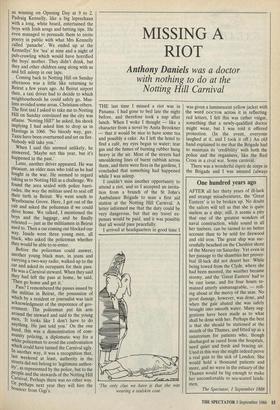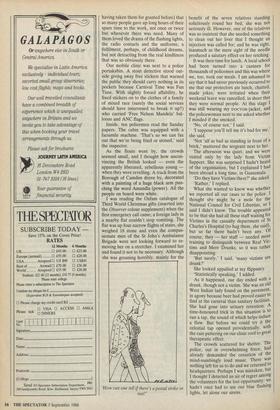MISSING A RIOT
Anthony Daniels was a doctor
with nothing to do at the Notting Hill Carnival
THE last time I missed a riot was in Panama. I had gone to bed late the night before, and therefore took a nap after lunch. When I woke I thought — like a character from a novel by Anita Brookner — that it would be nice to have some tea and possibly a cake. As I left the hotel to find a café, my eyes began to water; tear gas and the fumes of burning rubber hung heavy in the air. Most of the streets had smouldering lines of burnt rubbish across them, and there were fires in the gardens, I concluded that something had happened while I was asleep.
I couldn't miss another opportunity to attend a riot, and so I accepted an invita- tion from a branch of the St John's Ambulance Brigade to man a first aid station at the Notting Hill Carnival. A letter informed me that the duty could be very dangerous, but that my travel ex- penses would be paid, and it was possible that all would pass peacefully.
I arrived at headquarters in good time 'The only clue we have is that she was wearing a sealskin coat.'
was given a luminescent yellow jacket with the word DOCTOR across it in reflecting red letters, I felt this was rather vulgar, something that a newly-qualified doctor might wear, but I was told it offered protection. (In the event, everyone laughed at it, and I took it off.) An old hand explained to me that the Brigade had to maintain its 'credibility' with both the police and the organisers, like the Red Cross in a cival war. Some carnival.
There was a wonderful esprit de corps in the Brigade and - I was amazed (always having taken them for granted before) that so many people gave up long hours of their spare time to the work, not once or twice but whenever there was need. Many of them loved the drama of the flashing lights, the radio contacts and the uniforms; a fulfilment, perhaps, of childhood dreams, but not detracting from the real kindliness that was so obviously there.
Our mobile clinic was next to a police portakabin. A stout detective stood out- side giving away free stickers that warned the public they should carry nothing in its pockets because Carnival Time was Fun Time. With slightly forced affability, he fixed stickers on to the clothes of a family of mixed race (surely the social services should have intervened to break it up?) who carried 'Free Nelson Mandela' bal- loons and ANC flags.
Inside, ten policemen read the Sunday papers. The cabin was equipped with a facsimile machine. 'That's so we can fax out that we're being fried or stoned,' said the inspector.
As the floats went by, the crowds seemed small, and I thought how uncon- vincing the British looked — even the apparently liberated, rebellious young when they were revelling. A truck from the Borough of Camden drove by, decorated with a painting of a huge black arm pun- ching the word Amandla (power). All the people on board were white. I was reading the Oxfam catalogue of Third World Christmas gifts (inserted into the Observer colour supplement) when the first emergency call came; a foreign lady in a nearby flat couldn't stop vomiting. The flat was up four narrow flights of stairs, she weighed 18 stone and even the compas- sionate men of the St John's Ambulance Brigade were not looking forward to re- moving her on a stretcher. I examined her and found it not to be necessary. Although she was groaning horribly, mainly for the
'How can one tell if there's a postal strike or not?' benefit of the seven relatives standing solicitously round her bed, she was not seriously ill. However, one of the relatives was so insistent that she needed something to clean out her liver that I thought an injection was called for; and he was right, inasmuch as the mere sight of the needle produced a salutary effect on her retching. It was then time for lunch. A local school had been turned into a canteen for thousands of policemen and this was where we, too, took our meals. I am ashamed to say that it had never previously occurred to me that our protectors ate lunch, chatted, made jokes, were irritated when their weekend leave was cancelled, in short that they were normal people. At this stage I was still wearing my DocroR-jacket, and the policewoman next to me asked whether I minded if she smoked.
`No, of course not,' I said.
'I suppose you'll tell me it's bad for me,' she said.
`Not 'alf as bad as standing in front of a brick,' muttered the sergeant next to her. The afternoon was quiet, and we were visited only by the lady from Victim Support. She was surprised I hadn't heard of the organisation, but I explained I had been abroad a long time, in Guatemala. 'Do they have Victims there?' she asked.
'Rather,' I replied. What she wanted to know was whether we reported all our cases to the police. thought st‘e might be a mole for the National Council for Civil Liberties, so I said I didn't know. The trouble appeared to be that she had all these staff waiting for Victims in the casualty department of St Charles's Hospital (to hug them, she said), but so far there hadn't been any. Of course, they — her staff — needed more training to distinguish between Real Vic- tims and Mere Drunks, so it was rather disappointing. `But surely,' I said, 'many victims are drunk?'
She looked appalled at my flippancy. `Statistically speaking,' I added. As it happened, our day ended with drunk, though not a victim. She was an old West Indian lady found on the pavement, in agony because beer had proved easier to find at the carnival than sanitary facilities. She had gone into urinary retention. A time-honoured trick in this situation is to run a tap, the sound of which helps induce a flow. But before we could try it the celestial tap opened providentially, with the rain pattering on our clinic roof to great therapeutic effect. The crowds scattered for shelter. The police, out in overwhelming force, had already demanded the cessation of the mind-numbingly loud music. There was nothing left for us to do and we returned to headquarters. Perhaps I was mistaken, but I thought I detected an air of regret among the volunteers for the lost opportunity: yve hadn't once had to use our blue flashing lights, let alone our sirens.











































 Previous page
Previous page